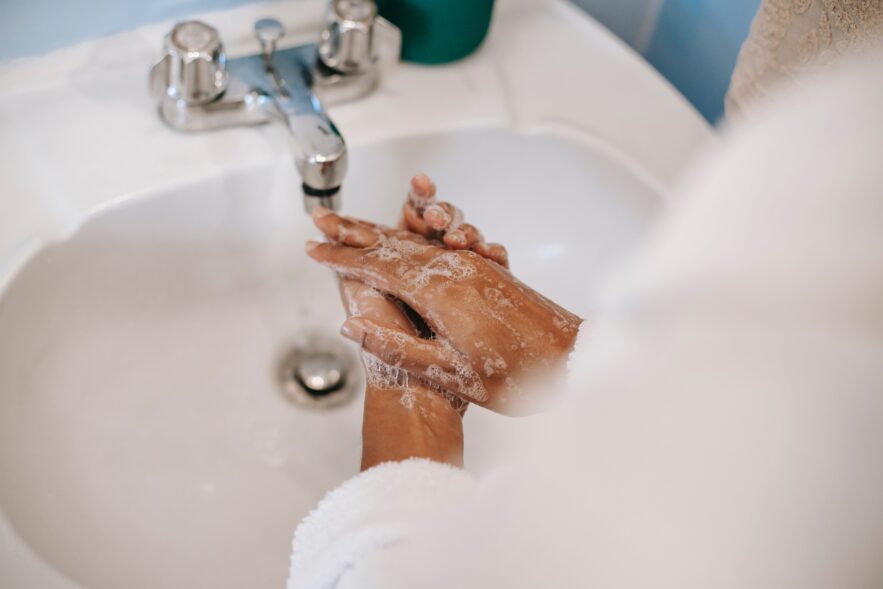Fungal skin infections affect various body parts, including the thighs, buttocks, nails, scalp, hands, and toes. Even if most of these cases — like athlete’s foot or ringworm — are not life-threatening, they can be bothersome and highly contagious. Learn six lifestyle tips to sidestep them and prevent fungal infections.
1. Shower at Least Once a Day
You should daily to protect your skin health and overall well-being. Daily activities from walking to working out let your body accumulate dirt, odor, sweat and grease.
If you don’t shower, buildup can clog your pores, causing infections that lead to acne, dandruff, and flare-ups of skin conditions like eczema. Meanwhile, those with oilier skin can maintain the balance of good bacteria and skin protection by showering at least once daily.
Your skin also produces a natural yeast called Candida, whose overgrowth can cause a fungal infection. Daily showers can help to keep that growth to normal levels, allowing you to keep a healthy balance of natural yeasts and bacteria on the skin.
2. Change Into Clean, Dry Clothes
Clothes and towels can spread germs and potentially cause skin diseases or fungal infection. Microorganisms can transfer from used garments to the skin, so changing into clean tops and bottoms after bathing can break the spread of germs and eliminate the risk of illness.
Before changing into a fresh set of clothes, ensure you towel your entire body dry. Fungi thrive in moist environments, so slightly wet skin can be a breeding ground for infection.
3. Avoid Wearing Tight Clothing
Wearing tight clothes can be trendy at times, but not always healthy. Most garments nowadays are made of synthetic fibers that don’t allow the skin to “breathe” as it naturally does. As a result, your sweat creates a moist and warm environment, ideal for fungi growth.
For instance, wearing too-tight pants can result in vaginal yeast infections in women, so try to wear loose apparel to dodge this problem. Choose highly breathable fabrics if you need to wear tight shirts and leggings so your skin stays dry.
4. Refrain From Walking Barefoot
Athlete’s foot is a prevalent infection that features scaly, dry, and/or itchy skin between the toes, often between the fourth and fifth toes. It’s common in young adult males, mainly because they frequent the places where fungi spread, like locker rooms and gyms.
Meanwhile, older adults are more at risk of another foot fungal infection called onychomycosis due to their weakened immune system. If they have diabetes or neuropathy, a toenail fungus can be seriously dangerous as bacterial infections can further develop.
Walking barefoot in public areas like swimming pools and gym showers is the primary method for transmitting fungal infections. Always wear aqua shoes or slippers when strutting in wet places. If you can’t avoid it, wash and dry your feet afterward to keep them clean and fungus-free.
5. Maintain Good Hand Hygiene
Besides your clothing, your entire hands — including your nails — can transfer infections that cause ringworm or tinea manuum, which is prevalent in people who use public showers, handle animals, and play sports that involve skin contact. Once infected, the hands will turn red, itchy, and scaly. Be sure to cut your nails frequently and wash your hands after using the toilet or touching dirty areas.
6. Eat Foods Rich in Probiotics
Probiotics — the good bacteria in foods like yogurt — can hinder the growth of fungi that cause infections on different body surfaces. Experts believe skin health is affected by the state of microorganisms in the gut. Since consuming probiotics restores balance in the gut microbiome, its benefits are carried over to skin health and improve infections.
The live bacteria from foods like kefir, tempeh, and kimchi are already good for the digestive system. It’s an added benefit if they also boost skin health. Make sure to fill your plate with this gut-boosting goodness. For more on foods to eat or delete from your diet, check out our MedShadow Registered Dietician’s guide here.
Prevent Fungal Infections With a Hygienic Lifestyle
It’s impressive how minor shifts in your lifestyle — such as daily baths, changing into fresh clothes and protecting your feet — can save you by preventing fungal infections. While the risk factors triggering these infections can come from family history and health conditions, your body will thank you if you keep it as healthy, clean, and balanced as possible.






